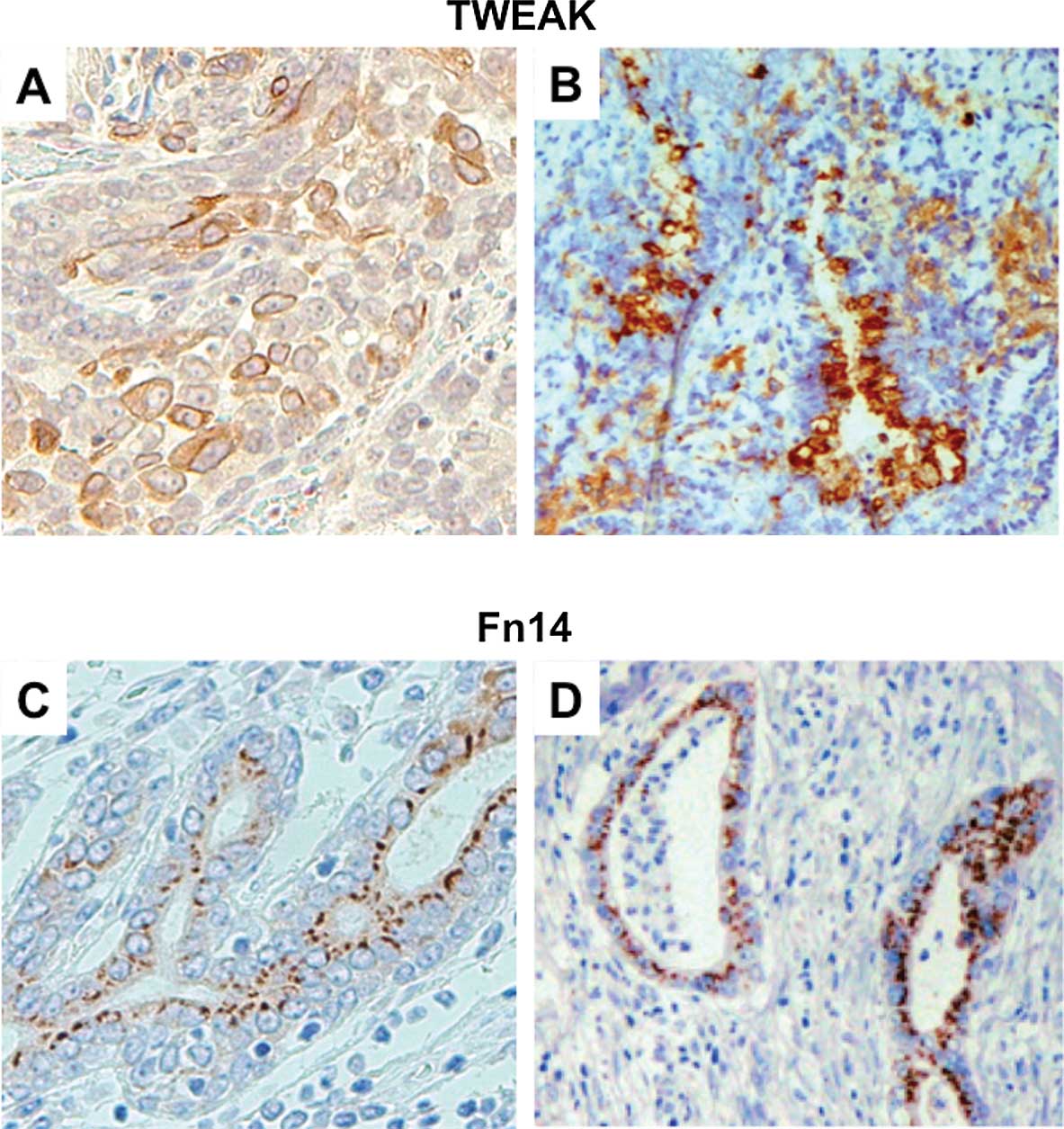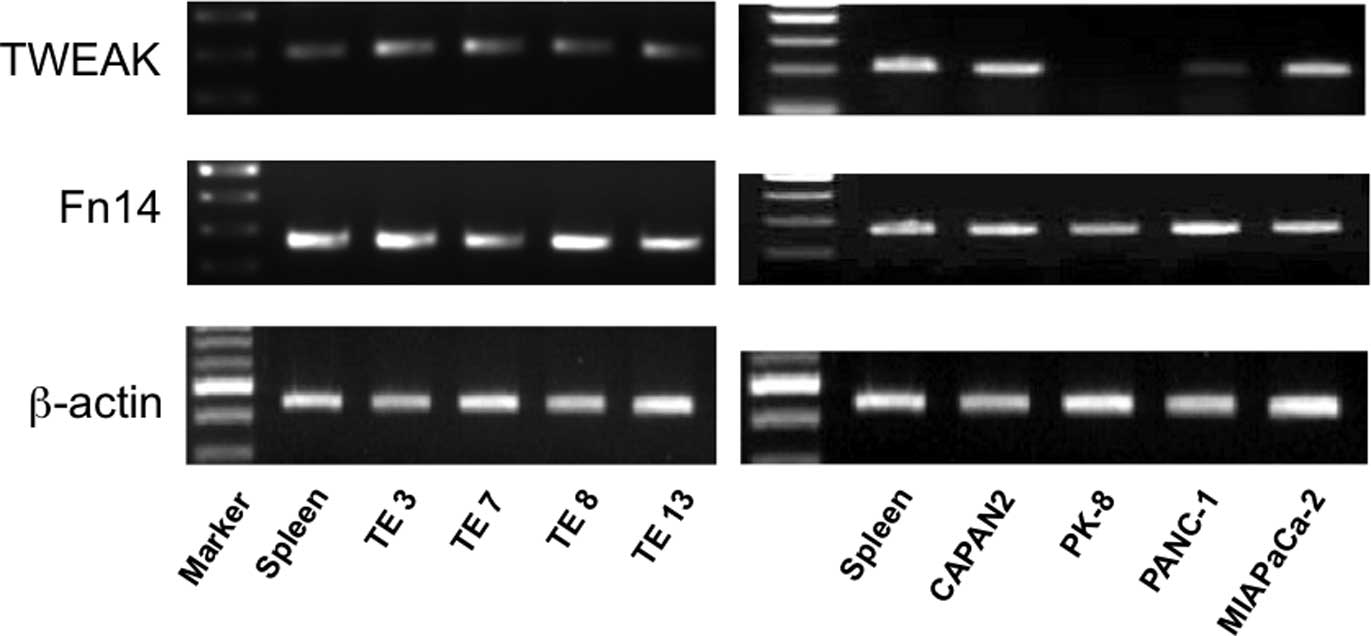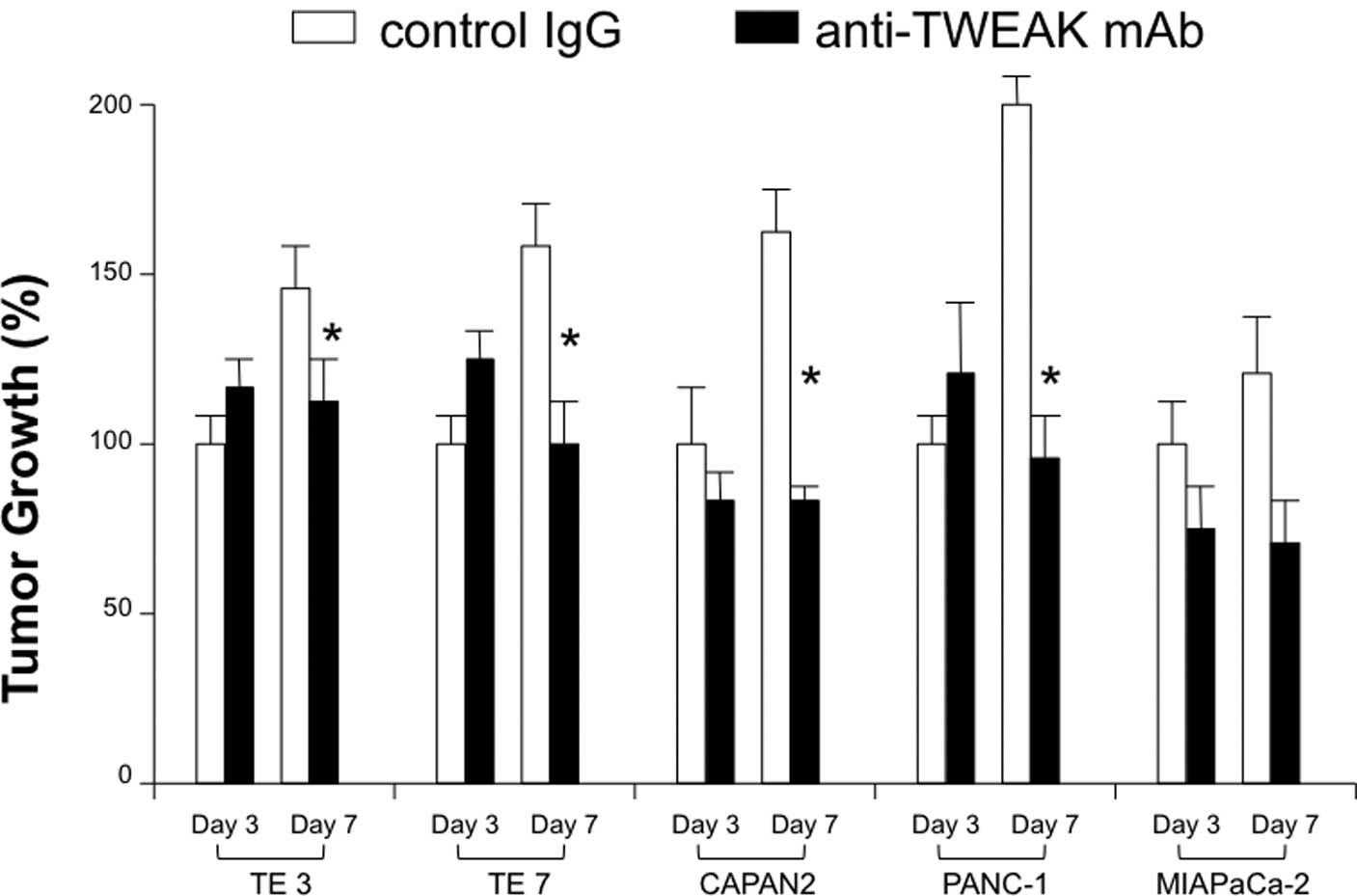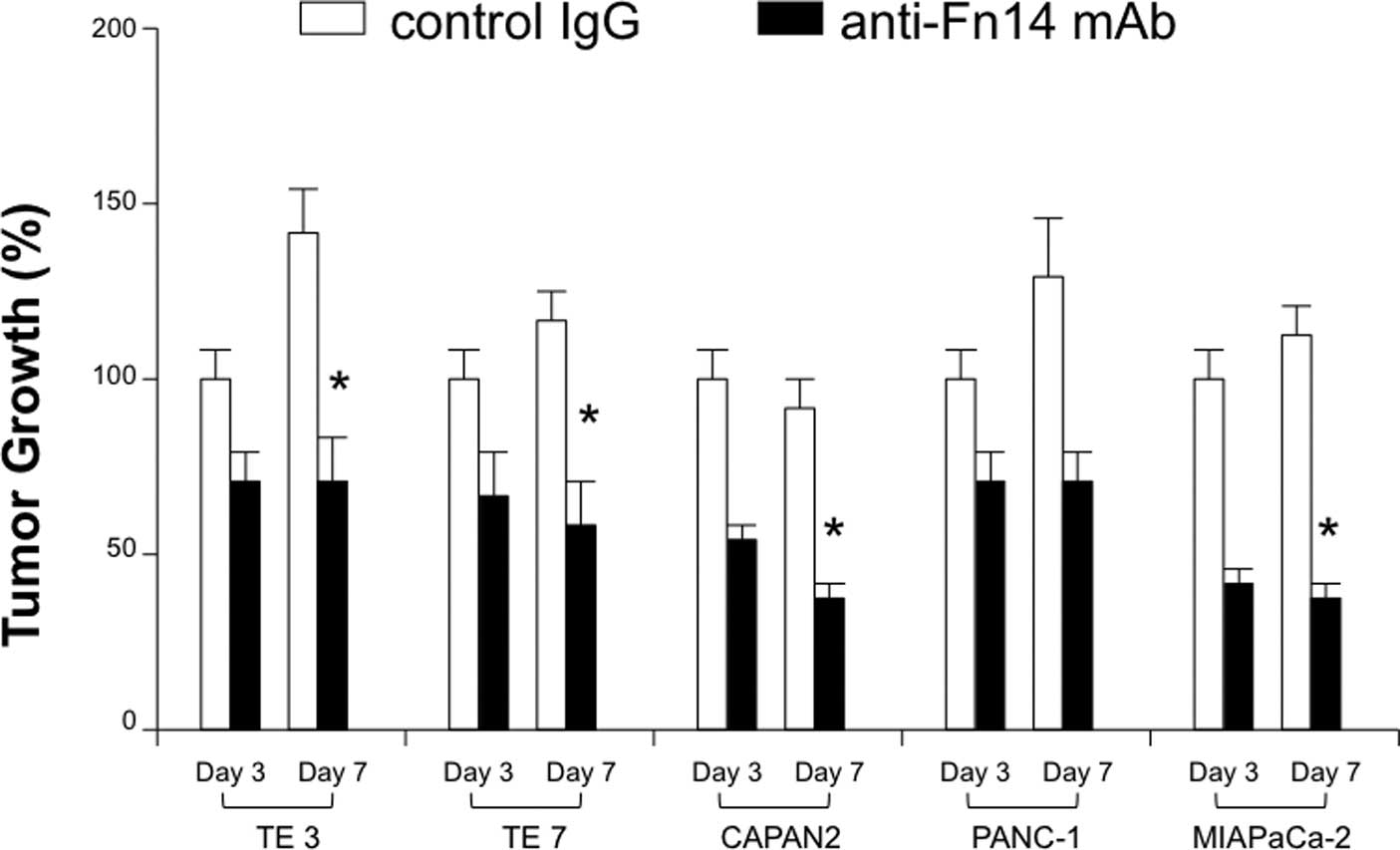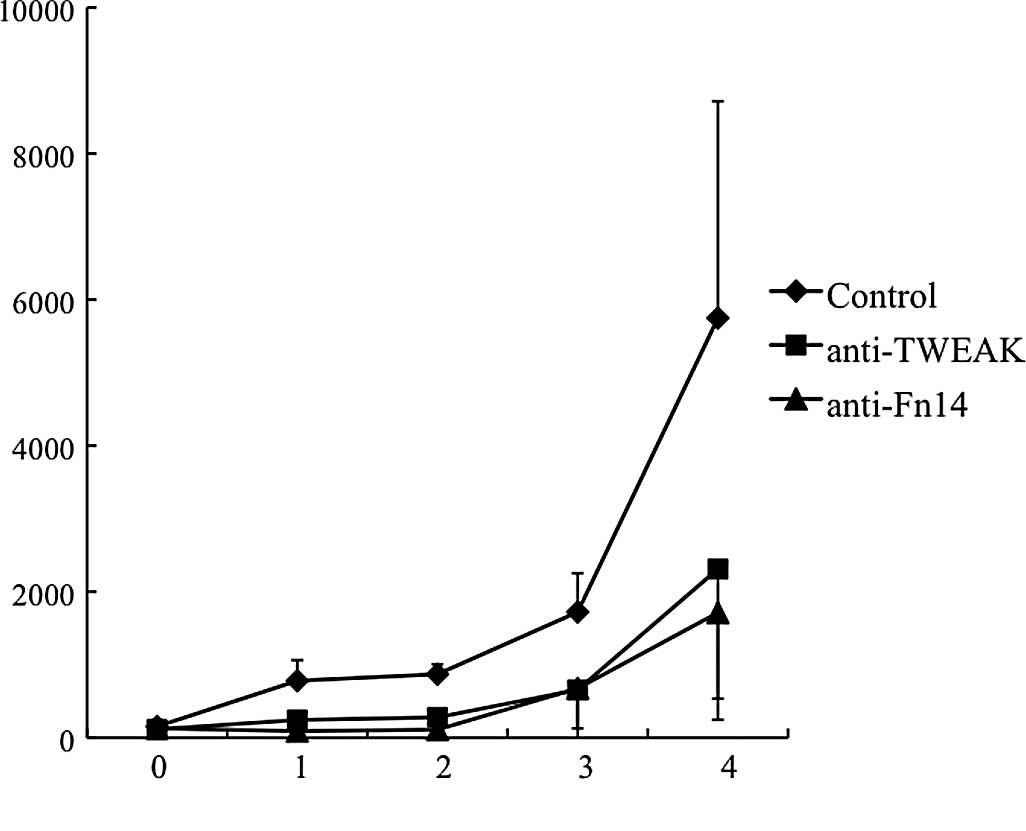|
1.
|
Jemal A, Siegel R, Xu J and Ward E: Cancer
statistics, 2010. CA Cancer J Clin. 60:277–300. 2010. View Article : Google Scholar
|
|
2.
|
Kamangar F, Dores GM and Anderson WF:
Patterns of cancer incidence, mortality, and prevalence across five
continents: defining priorities to reduce cancer disparities in
different geographic regions of the world. J Clin Oncol.
24:2137–2150. 2006. View Article : Google Scholar
|
|
3.
|
Li D, Xie K, Wolff R and Abbruzzese JL:
Pancreatic cancer. Lancet. 363:1049–1057. 2004. View Article : Google Scholar
|
|
4.
|
Chicheportiche Y, Bourdon PR, Xu H, Hsu
YM, Scott H, Hession C, Garcia I and Browning JL: TWEAK, a new
secreted ligand in the tumor necrosis factor family that weakly
induces apoptosis. J Biol Chem. 272:32401–32410. 1997. View Article : Google Scholar : PubMed/NCBI
|
|
5.
|
Winkles JA: The TWEAK-Fn14
cytokine-receptor axis: discovery, biology and therapeutic
targeting. Nat Rev Drug Discov. 7:411–425. 2008. View Article : Google Scholar : PubMed/NCBI
|
|
6.
|
Wiley SR, Cassiano L, Lofton T,
Davis-Smith T, Winkles JA, Lindner V, Liu H, Daniel TO, Smith CA
and Fanslow WC: A novel TNF receptor family member binds TWEAK and
is implicated in angiogenesis. Immunity. 15:837–846. 2001.
View Article : Google Scholar : PubMed/NCBI
|
|
7.
|
Kumar M, Makonchuk DY, Li H, Mittal A and
Kumar A: TNF-like weak inducer of apoptosis (TWEAK) activates
proinflammatory signaling pathways and gene expression through the
activation of TGF-beta-activated kinase 1. J Immunol.
182:2439–2448. 2009. View Article : Google Scholar : PubMed/NCBI
|
|
8.
|
Polek TC, Talpaz M, Darnay BG and
Spivak-Kroizman T: TWEAK mediates signal transduction and
differentiation of RAW264.7 cells in the absence of Fn14/TweakR.
Evidence for a second TWEAK receptor. J Biol Chem. 278:32317–32323.
2003. View Article : Google Scholar : PubMed/NCBI
|
|
9.
|
Harada N, Nakayama M, Nakano H, Fukuchi Y,
Yagita H and Okumura K: Pro-inflammatory effect of TWEAK/Fn14
interaction on human umbilical vein endothelial cells. Biochem
Biophys Res Commun. 299:488–493. 2002. View Article : Google Scholar : PubMed/NCBI
|
|
10.
|
Zhao Z, Burkly LC, Campbell S, Schwartz N,
Molano A, Choudhury A, Eisenberg RA, Michaelson JS and Putterman C:
TWEAK/Fn14 interactions are instrumental in the pathogenesis of
nephritis in the chronic graft-versus-host model of systemic lupus
erythematosus. J Immunol. 179:7949–7958. 2007. View Article : Google Scholar : PubMed/NCBI
|
|
11.
|
Desplat-Jego S, Creidy R, Varriale S,
Allaire N, Luo Y, Bernard D, Hahm K, Burkly L and Boucraut J:
Anti-TWEAK monoclonal antibodies reduce immune cell infiltration in
the central nervous system and severity of experimental auto-immune
encephalomyelitis. Clin Immunol. 117:15–23. 2005. View Article : Google Scholar : PubMed/NCBI
|
|
12.
|
Perper SJ, Browning B, Burkly LC, et al:
TWEAK is a novel arthritogenic mediator. J Immunol. 177:2610–2620.
2006. View Article : Google Scholar : PubMed/NCBI
|
|
13.
|
Kamata K, Kamijo S, Nakajima A, Koyanagi
A, Kurosawa H, Yagita H and Okumura K: Involvement of TNF-like weak
inducer of apoptosis in the pathogenesis of collagen-induced
arthritis. J Immunol. 177:6433–6439. 2006. View Article : Google Scholar : PubMed/NCBI
|
|
14.
|
Kawakita T, Shiraki K, Yamanaka Y,
Yamaguchi Y, Saitou Y, Enokimura N, Yamamoto N, Okano H, Sugimoto
K, Murata K and Nakano T: Functional expression of TWEAK in human
colonic adenocarcinoma cells. Int J Oncol. 26:87–93.
2005.PubMed/NCBI
|
|
15.
|
Kawakita T, Shiraki K, Yamanaka Y,
Yamaguchi Y, Saitou Y, Enokimura N, Yamamoto N, Okano H, Sugimoto
K, Murata K and Nakano T: Functional expression of TWEAK in human
hepatocellular carcinoma: possible implication in cell
proliferation and tumor angiogenesis. Biochem Biophys Res Commun.
318:726–733. 2004. View Article : Google Scholar : PubMed/NCBI
|
|
16.
|
Tran NL, McDonough WS, Savitch BA, et al:
Increased fibroblast growth factor-inducible 14 expression levels
promote glioma cell invasion via Rac1 and nuclear factor-kappaB and
correlate with poor patient outcome. Cancer Res. 66:9535–9542.
2006. View Article : Google Scholar : PubMed/NCBI
|
|
17.
|
Han H, Bearss DJ, Browne LW, Calaluce R,
Nagle RB and von Hoff DD: Identification of differentially
expressed genes in pancreatic cancer cells using cDNA microarray.
Cancer Res. 62:2890–2896. 2002.PubMed/NCBI
|
|
18.
|
Feng SL, Guo Y, Factor VM, Thorgeirsson
SS, Bell DW, Testa JR, Peifley KA and Winkles JA: The Fn14
immediate-early response gene is induced during liver regeneration
and highly expressed in both human and murine hepatocellular
carcinomas. Am J Pathol. 156:1253–1261. 2000. View Article : Google Scholar
|
|
19.
|
Culp PA, Choi D, Zhang Y, et al:
Antibodies to TWEAK receptor inhibit human tumor growth through
dual mechanisms. Clin Cancer Res. 16:497–508. 2010. View Article : Google Scholar : PubMed/NCBI
|
|
20.
|
Tran NL, McDonough WS, Savitch BA, Sawyer
TF, Winkles JA and Berens ME: The tumor necrosis factor-like weak
inducer of apoptosis (TWEAK)-fibroblast growth factor-inducible 14
(Fn14) signaling system regulates glioma cell survival via NFkappaB
pathway activation and BCL-XL/BCL-W expression. J Biol Chem.
280:3483–3492. 2005. View Article : Google Scholar
|
|
21.
|
Ho DH, Vu H, Brown SA, Donohue PJ, Hanscom
HN and Winkles JA: Soluble tumor necrosis factor-like weak inducer
of apoptosis overexpression in HEK293 cells promotes tumor growth
and angiogenesis in athymic nude mice. Cancer Res. 64:8968–8972.
2004. View Article : Google Scholar : PubMed/NCBI
|
|
22.
|
Winkles JA, Tran NL and Berens ME: TWEAK
and Fn14: new molecular targets for cancer therapy? Cancer Lett.
235:11–17. 2006. View Article : Google Scholar : PubMed/NCBI
|
|
23.
|
Polavarapu R, Gongora MC, Winkles JA and
Yepes M: Tumor necrosis factor-like weak inducer of apoptosis
increases the permeability of the neurovascular unit through
nuclear factor-kappa B pathway activation. J Neurosci.
25:10094–10100. 2005. View Article : Google Scholar : PubMed/NCBI
|
|
24.
|
Potrovita I, Zhang W, Burkly L, Hahm K,
Lincecum J, Wang MZ, Maurer MH, Rossner M, Schneider A and
Schwaninger M: Tumor necrosis factor-like weak inducer of
apoptosis-induced neurodegeneration. J Neurosci. 24:8237–8244.
2004. View Article : Google Scholar : PubMed/NCBI
|
|
25.
|
Nakayama M, Harada N, Okumura K and Yagita
H: Characterization of murine TWEAK and its receptor (Fn14) by
monoclonal antibodies. Biochem Biophys Res Commun. 306:819–825.
2003. View Article : Google Scholar : PubMed/NCBI
|
|
26.
|
Nakayama M, Ishidoh K, Kojima Y, Harada N,
Kominami E, Okumura K and Yagita H: Fibroblast growth
factor-inducible 14 mediates multiple pathways of TWEAK-induced
cell death. J Immunol. 170:341–348. 2003. View Article : Google Scholar : PubMed/NCBI
|
|
27.
|
Han S, Yoon K, Lee K, Kim K, Jang H, Lee
NK, Hwang K and Young Lee S: TNF-related weak inducer of apoptosis
receptor, a TNF receptor superfamily member, activates NF-kappa B
through TNF receptor-associated factors. Biochem Biophys Res
Commun. 305:789–796. 2003. View Article : Google Scholar : PubMed/NCBI
|
|
28.
|
Watts GS, Tran NL, Berens ME,
Bhattacharyya AK, Nelson MA, Montgomery EA and Sampliner RE:
Identification of Fn14/TWEAK receptor as a potential therapeutic
target in esophageal adenocarcinoma. Int J Cancer. 121:2132–2139.
2007. View Article : Google Scholar : PubMed/NCBI
|
|
29.
|
Wang D, Fung JN, Tuo Y, Hu L and Chen C:
TWEAK/Fn14 promotes apoptosis of human endometrial cancer cells via
caspase pathway. Cancer Lett. 294:91–100. 2010. View Article : Google Scholar : PubMed/NCBI
|
|
30.
|
Jakubowski A, Ambrose C, Parr M, Lincecum
JM, Wang MZ, Zheng TS, Browning B, Michaelson JS, Baetscher M, Wang
B, Bissell DM and Burkly LC: TWEAK induces liver progenitor cell
proliferation. J Clin Invest. 115:2330–2340. 2005. View Article : Google Scholar : PubMed/NCBI
|
|
31.
|
Tanabe K, Bonilla I, Winkles JA and
Strittmatter SM: Fibroblast growth factor-inducible-14 is induced
in axotomized neurons and promotes neurite outgrowth. J Neurosci.
23:9675–9686. 2003.PubMed/NCBI
|
|
32.
|
Girgenrath M, Weng S, Kostek CA, et al:
TWEAK, via its receptor Fn14, is a novel regulator of mesenchymal
progenitor cells and skeletal muscle regeneration. EMBO J.
25:5826–5839. 2006. View Article : Google Scholar : PubMed/NCBI
|
|
33.
|
Moore MJ, Goldstein D, Hamm J, et al:
Erlotinib plus gemcitabine compared with gemcitabine alone in
patients with advanced pancreatic cancer: a phase III trial of the
National Cancer Institute of Canada Clinical Trials Group. J Clin
Oncol. 25:1960–1966. 2007. View Article : Google Scholar
|















